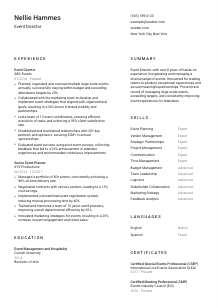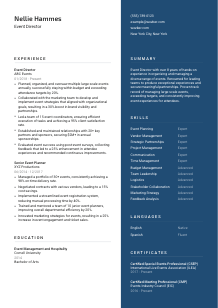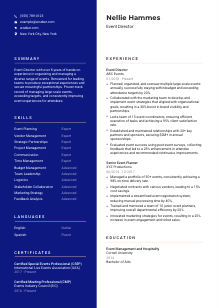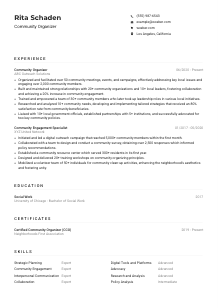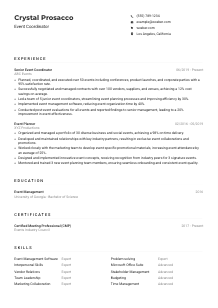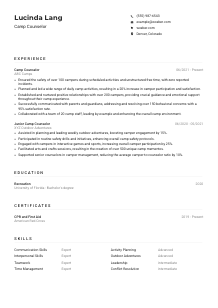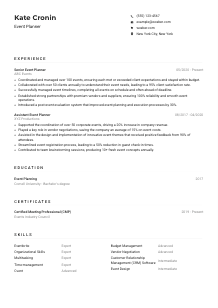Event Director Resume Example
Masterminding events, but your resume feels like a no-show? Command the spotlight with this Event Director resume example, orchestrated using Wozber free resume builder. Discover how seamlessly you can sync your event production prowess with job criteria, propelling your career to center stage!

How to write an Event Director resume?
Stepping into the role of an Event Director requires more than just a passion for creating memorable experiences; it demands a resume that showcases your capabilities in a way that resonates with hiring managers. As you embark on this journey, remember, your resume is more than a piece of paper - it's a storytelling tool that speaks volumes about your professional journey. With the help of Wozber's free resume builder, tailored specifically for crafting ATS-compliant resumes, we'll guide you through creating an ATS-friendly resume that's as unforgettable as the events you aspire to direct.
Ready to light up your career path? Let's dive in.
Personal Details
The opening act of your resume sets the stage. As Event Director, attention to detail is second nature to you, so let's apply that precision to your personal details section.
1. Name as Your Brand
Your name is the marquee on your personal theater. Make it bold; ensure it's the highlight of the section using an ATS-friendly resume format. With Wozber, you won't have to worry about formatting; the focus is on content. This is where you make your first impression!
2. Job Title Wisely
Directly below your name, align yourself with the role at hand by stating 'Event Director'. This not only confirms your suitability but also helps in ATS optimization, ensuring your resume speaks directly to the desired role.
3. Essential Contact Info
Keep it professional and straightforward. A contact number, a professional email, and optionally, a LinkedIn profile that echoes the professionalism of your resume, can make a world of difference. Remember, an email like first.last@email.com maintains the professional aesthetic you want to convey.
4. Location, Location, Location
"Must be located in New York City, New York" - the job description calls for it, your resume answers. This immediately signals your suitability, erasing any doubts about relocation or availability that the hiring team might have.
5. Digital Footprint
In today's world, an online presence can be a game-changer. Include a link to your professional website or portfolio that showcases your event masterpieces, ensuring that it's clean, functional, and mirrors the professional you.
Takeaway
Your personal details are the opening note of your professional symphony. Craft them to be clear, concise, and aligned with the Event Director role you're targeting. Imagine it as the invitation to your next grand event - make it impossible to ignore.





Experience
The experience section is where you shine a spotlight on your achievements. As an Event Director, weaving a narrative of successful events, sophisticated logistics, and meaningful partnerships is key.
- Planned, organized, and oversaw multiple large‑scale events annually, successfully staying within budget and exceeding attendance targets by 20%.
- Collaborated with the marketing team to develop and implement event strategies that aligned with organizational goals, resulting in a 30% boost in brand visibility and partnerships.
- Led a team of 15 event coordinators, ensuring efficient execution of tasks and achieving a 95% client satisfaction rate.
- Established and maintained relationships with 20+ key partners and sponsors, securing $2M+ in annual sponsorships.
- Evaluated event success using post‑event surveys, collecting feedback that led to a 25% enhancement in attendee experiences and recommended continuous improvements.
- Managed a portfolio of 30+ events, consistently achieving a 98% on‑time delivery rate.
- Negotiated contracts with various vendors, leading to a 15% cost savings.
- Implemented a streamlined event registration system, reducing manual processing time by 40%.
- Trained and mentored a team of 10 junior event planners, improving overall departmental efficiency by 20%.
- Innovated marketing strategies for events, resulting in a 25% increase in event engagement and ticket sales.
1. Highlight Relevance
Breakdown the job description, identifying opportunities to reflect on your experiences. For example, managing large-scale events and teams showcases your leadership and organizational acumen, directly answering the job's requirements.
2. Structured Narration
Chronicle your career journey starting from your most recent role. Use an ATS-friendly resume template from Wozber that automatically ensures your work history is easy to follow and optimized for ATS scanners.
3. Achievement-Focused Statements
Instead of merely listing duties, focus on your triumphs. Highlight how you exceeded attendance targets by 20% or secured $2M+ in sponsorships. These tangible achievements tell a story of success.
4. Numbers Speak Louder
Quantify your wins wherever possible. Be it through budget management, audience numbers, or sponsorship values, these figures provide a concrete measure of your impact and capability.
5. Relevance is Key
Trim the excess. Every piece of your history should reflect your suitability for the Event Director role. Ancillary tasks might have honed valuable skills, but focus on the experiences that directly align with the role's requirements.
Takeaway
Your experience section is the main event of your resume. It's your chance to showcase why you're not just a suitable candidate, but the candidate. Remember, it's about quality, not just quantity. With each bullet, ask yourself, 'Does this highlight my prowess as an Event Director?'
Education
Even for a role as dynamic and experience-focused as an Event Director, your educational background plays a crucial supporting role in setting the foundation of your expertise.
1. Connect the Dots
Your 'Bachelor of Arts in Event Management and Hospitality' isn't just a degree; it's proof of your grounding in the field. Align this exactly as mentioned in your resume to match the job description's ask.
2. Structure Matters
Keep it simple yet informative. List your degree, followed by your field of study, institution, and graduation year. An ATS-friendly resume format ensures this information is readily accessible and easily scanned.
3. Tailor to Suit
Your educational experiences should reflect the requirements of the role. For this position, emphasizing your specialization in Event Management directly correlates with the job's expectations.
4. Relevant Extras
If there are standout aspects of your education that further cement your fit for the role - be it related coursework, honors, or extracurricular leadership roles - don't hesitate to include them.
5. Continuous Learning
In a fast-evolving field like Event Management, showing that you're engaged in learning (through certifications or additional courses) demonstrates your commitment to staying ahead. Highlight any continued education relevant to the role.
Takeaway
Your education section is your professional foundation; it demonstrates your initial commitment to this career path. While your experiences are the stars of the show, don't underestimate the power of a well-articulated educational history to solidify your credibility.
Certificates
In the world of event planning, certifications can be the icing on the cake, showcasing your dedication to excellence and continuous improvement.
1. Curate with Purpose
Include certifications that bolster your credentials for the Event Director role. 'Certified Meeting Professional (CMP)' and 'Certified Special Events Professional (CSEP)' aren't just acronyms; they're seals of excellence that affirm your expertise.
2. Alignment Matters
Select certifications that directly align with the demands of your target role. Quality trumps quantity, and relevant certifications will resonate more with hiring managers than a long list of unrelated accolades.
3. Transparency is Key
Be clear about the validity of your certifications. Dates indicate not just achievement but also the currency of your knowledge in a fast-paced field.
4. Commitment to Growth
Continuous learning is pivotal in the dynamic field of event management. Regularly updating your certifications, and seeking out new ones, demonstrates your dedication to keeping your skills sharp and relevant.
Takeaway
Certifications, while not the make-or-break of your resume, add a valuable layer of credibility. They're proof of your willingness to go the extra mile in your professional development. Select and display them thoughtfully to complement your experience and educational background.
Skills
Your skills section is a concise showcase of your professional toolkit. For the Event Director role, this is where you highlight the hard and soft skills that make you an expert maestro of events.
1. Decode the Job Description
Review the job description carefully and pick out skills that are directly requested or implied. Incorporating these into your resume ensures ATS optimization and demonstrates your alignment with the role's demands.
2. Prioritize Relevance
List skills that resonate most with the job description. For instance, 'Event Planning', 'Budget Management', and 'Team Leadership' are not just skills but indispensable tools in your arsenal as an Event Director.
3. Organize for Impact
Avoid a scattered skills section. Use an organized, decluttered format that ensures your key skills are immediately noticeable. With Wozber's ATS-friendly resume templates, your skills will be presented in a way that catches the eye of both human and digital reviewers.
Takeaway
Craft your skills section as a powerful, succinct testament to your qualifications. Think of it as your highlight reel - each listed skill should underscore your capability and readiness to excel as an Event Director. Be strategic, be selective, and above all, align your skills with the narrative of your professional journey.
Languages
In the diverse and multicultural world of event planning, being multilingual can be a distinct advantage. Tailor this section to showcase your linguistic strengths, ensuring they align with the job's requirements and the broader scope of your role.
1. Stick to the Script
If a job description specifies language skills, as 'Fluent English speaking and writing skills necessary' does in ours, that's your cue. List English at the top of your languages, clearly marking your proficiency as 'Native' or 'Fluent'.
2. Additional Languages
Beyond the required English, consider other languages you're proficient in. Each additional language is a door to more opportunities, potentially giving you an edge in organizing international events or dealing with diverse clientele.
3. Honesty in Proficiency
Accurately representing your fluency levels avoids any future misunderstandings. From 'Native' to 'Basic', be clear about your capabilities, keeping in mind the specific needs and potential global reach of your role as an Event Director.
4. Reflect on the Role's Requirements
In a role that might involve engaging with international clients or vendors, showcasing your linguistic diversity can significantly impact your resume's attractiveness.
5. Make It a Talking Point
Languages are a unique aspect of your profile. Even if a role doesn't explicitly demand multilingual skills, they offer a way to stand out. Consider the global nature of event management today; your multilingual skills could open up unthought-of opportunities.
Takeaway
View your linguistic skills as both a professional asset and a personal trait that enhances your ability to communicate, negotiate, and engage in the richly diverse field of event management. Aligning this section with both the stated job requirements and the inherent international scope of the role showcases you as a globally minded Event Director.
Summary
Your summary is the grand entrance, setting the tone for the narrative that unfolds. For an Event Director, this is your moment to encapsulate your expertise, experiences, and the unique flair you bring to the table.
1. Set the Stage
Start with a clear, engaging introduction that positions you right at the heart of event management. Drawing from the job description, let's weave in how your expertise aligns perfectly with what they're seeking.
2. Showcase Your Skills
Highlight a blend of hard and soft skills that are crucial to your success in the role. Demonstrate how you've led teams, managed sizable budgets, and brought innovative ideas to fruition. These are your headliners, lighting up your credibility.
3. Highlight Key Achievements
Without delving too deep, touch upon benchmarks that underscore your accomplishments - perhaps a particularly successful event you directed or a significant partnership you forged. This teases the depth of your experience.
4. Keep It Tight
A strong summary is like a well-crafted invitation: succinct, engaging, and memorable. Aim for 3-5 lines that invite the hiring manager to learn more about you, setting the stage for the detailed narrative that your resume will unfold.
Takeaway
Your summary is your personal headline - a snapshot that compels the reader to dive deeper into your story. Craft it with the finesse of an Event Director designing the event of a lifetime. Let it speak volumes to your capability, your experience, and the unique perspective you bring to every event you direct.
Launching Your Event Director Journey
Crafting a resume that lands you the Event Director role you've been eyeing is akin to planning a successful event; it requires attention to detail, understanding the audience, and telling a compelling story. Remember, with Wozber's free resume builder, ATS-friendly resume templates, and ATS resume scanner, you have all the tools at your fingertips to create a resume that's not just a list of your experiences but a ticket to your next big opportunity. Let your resume be the invitation to your next great adventure in event management.
The stage is set, the audience awaits; it's time to make your mark.

- Bachelor's degree in Event Management, Hospitality, Marketing, or a related field.
- Minimum of 7 years of experience in event planning or management, with at least 3 years in a leadership role.
- Proven ability to manage large-scale events, budgets, and teams.
- Strong interpersonal and communication skills with the ability to collaborate effectively with cross-functional teams and stakeholders.
- Certification in Event Planning or related fields (if commonly mentioned in job ads).
- Fluent English speaking and writing skills necessary.
- Must be located in New York City, New York.
- Plan, organize, and oversee all aspects of events, including budgeting, logistics, venue selection, and vendor management.
- Work closely with the marketing team to develop event strategies aligning with organizational goals.
- Lead and manage a team of event coordinators, ensuring efficient execution of tasks and high-quality event experiences.
- Establish and maintain relationships with key partners, sponsors, and venues, negotiating contracts and securing resources for events.
- Evaluate event success, collect feedback, and make recommendations for continuous improvement.





